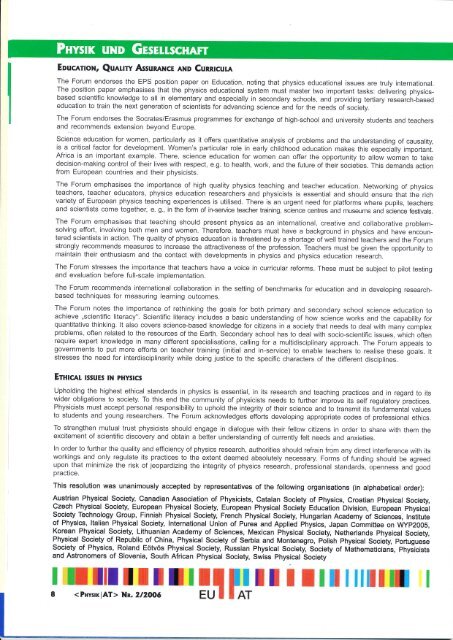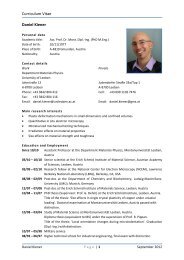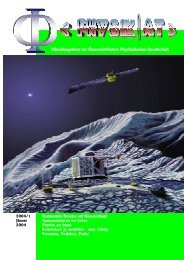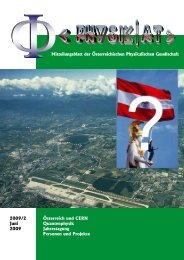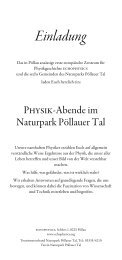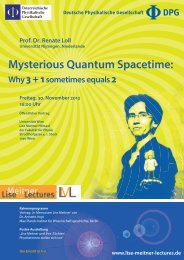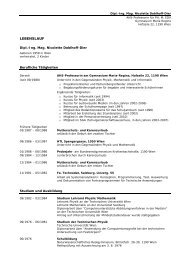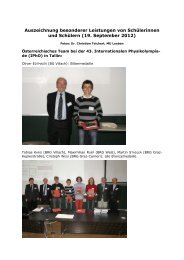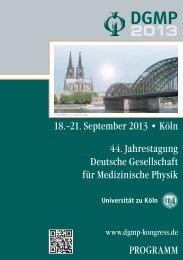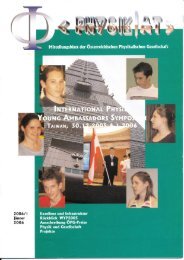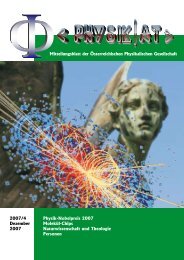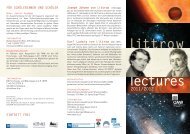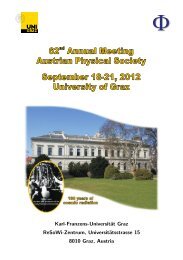Untitled - Austrian Physical Society
Untitled - Austrian Physical Society
Untitled - Austrian Physical Society
Erfolgreiche ePaper selbst erstellen
Machen Sie aus Ihren PDF Publikationen ein blätterbares Flipbook mit unserer einzigartigen Google optimierten e-Paper Software.
Eoucnnox, Qurrv Assunnrcr nxo Cunrucuua<br />
The Forum endorses the EPS position paper on Education, noting that physics educational issues are truly international.<br />
The position paper emphasises that the physics educational system must master two important tasks: delivering physicsbased<br />
scientific knowledge to all in elementary and especially in secondary schools, and providing tertiary reseaich-based<br />
education to train the next generation of scientists for advancing science and for the needs of society.<br />
The Forum endorses the Socrates/Erasmus programmes for exchange of high-school and university students and teachers<br />
and recommends extension beyond Europe.<br />
Science education for women, particularly as it offers quantitative analysis of problems and the understanding of causality,<br />
is a critical factor for development. Women's particular role in early childhood education makes this especiälly important.<br />
Africa is an important example. There, science education for women can offer the opportunity to allow women to take<br />
decision-making control of their lives with respect, e.g. to health, work, and the future of their societies" This demands action<br />
from European countries and their physicists.<br />
The Forum emphasises the importance of high quality physics teaching and teacher education. Networking of physics<br />
teachers, teacher educators, physics education researchers and physicists is essential and should ensure that the rich<br />
variety of European physics teaching experiences is utilised. There is an urgent need for platforms where pupils, teachers<br />
and scientists come together, e. g., in the form of in-service teacher training, science centres and museums and science festivals.<br />
The Forum emphasises that teaching should present physics as an international, creative and collaborative problemsolving<br />
effort, involving both men and women. Therefore, teachers must have a background in physics and have encountered<br />
scientists in action. The quality of physics education is threatened by a shortage of well trained teachers and the Forum<br />
strongly recommends measures to increase the attractiveness of the profession. Teachers must be given the opportunity to<br />
maintain their enthusiasm and the contact with developments in physics and physics education research.<br />
The Forum stresses the importance that teachers have a voice in curricular reforms. These must be subject to pilot testing<br />
and evaluation before full-scale implementation.<br />
The Forum recommends international collaboration in the setting of benchmarks for education and in developing researchbased<br />
techniques for measuring learning outcomes.<br />
The Forum notes the importance of rethinking the goals for both primary and secondary school science education to<br />
achieve ,,scientific literacy". Scientific literacy includes a basic understanding of how science works and the capability for<br />
quantitative thinking. lt also covers science-based knowledge for citizens in a society that needs to deal with many complex<br />
problems, often related to the resources of the Earth. Secondary school has to deal with socio-scientific issues, which often<br />
require expert knowledge in many different specialisations, calling for a multidisciplinary approach. The Forum appeals to<br />
governments to put more efforts on teacher training (initial and in-service) to enable teachers to realise these goals. lt<br />
stresses the need for interdisciplinarity while doing justice to the specific characters of the different disciplines.<br />
Erurcer rssuEs tN Puystcs<br />
Upholding the highest ethical standards in physics is essential, in its research and teaching practices and in regard to its<br />
wider obligations to society. To this end the community of physicists needs to further improve its self regulatory practices.<br />
Physicists must accept personal responsibility to uphold the integrity of their science and to transmit its fundamental values<br />
to students and young researchers. The Forum acknowledges efforts developing appropriate codes of professional ethics.<br />
To strengthen mutual trust physicists should engage in dialogue with their fellow citizens in order to share with them the<br />
excitement of scientific discovery and obtain a better understanding of currently felt needs and anxieties.<br />
ln order to further the quality and efficiency of physics research, authorities should refrain from any direct interference with its<br />
workings and only regulate its practices to the extent deemed absolutely necessary. Forms of funding should be agreed<br />
upon that minimize the risk of jeopardizing the integrity of physics research, professional standards, openness and good<br />
practice.<br />
This resolution was unanimously accepted by representatives of the following organisations (in alphabetical order):<br />
<strong>Austrian</strong> <strong>Physical</strong> <strong>Society</strong>, Canadian Association of Physicists, Catalan <strong>Society</strong> of Physics, Croatian physical <strong>Society</strong>,<br />
Czech <strong>Physical</strong> <strong>Society</strong>, European <strong>Physical</strong> <strong>Society</strong>, European Physiial <strong>Society</strong> Educätion Division, European physical<br />
<strong>Society</strong> Technology Group, Finnish <strong>Physical</strong> <strong>Society</strong>, French <strong>Physical</strong> <strong>Society</strong>, Hungarian Academy of Sciences, tnititute<br />
of Physics, ltalian <strong>Physical</strong> <strong>Society</strong>, lnternational l"lnion of Purea and Applied Phyiics, Japan Committee on Wyp2005,<br />
Korean <strong>Physical</strong> <strong>Society</strong>, Lithuanian Academy of Sciences, Mexican <strong>Physical</strong> <strong>Society</strong>, Netherlands physical <strong>Society</strong>,<br />
<strong>Physical</strong> <strong>Society</strong> of Republic of China, <strong>Physical</strong> <strong>Society</strong> of Serbia and Montenegro, Poiish physical <strong>Society</strong>, portuguese<br />
<strong>Society</strong> of Physics, Roland Eötvös <strong>Physical</strong> <strong>Society</strong>, Russian <strong>Physical</strong> <strong>Society</strong>, <strong>Society</strong> of lriathematicians, phyJcists<br />
and Astronomers of Slovenia, South African <strong>Physical</strong> <strong>Society</strong>, Swiss <strong>Physical</strong> <strong>Society</strong><br />
!ry,:,ltt#rrffilmrx<br />
r illr illnrr


